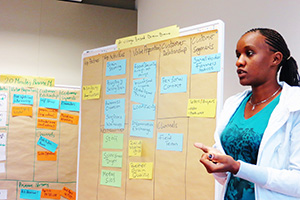From meeting friends and colleagues in intellectual forums, to attending great lectures, holding exciting discussions in tutorials, engaging with motivating professors, and the after class parties, there is no limit to the excitement and promises that the Uni offers. These aspects build up initial hopes for new students. However, there are also disappointments, especially when a desired program does not meet student’s expectations.
Many students are frustrated when they discover the difference between the notions they had about their choice of an academic programme, and the reality of what it entails. The Karrierebibel.de lists 11 unpleasant truths about University study that no one ever talks about.
- Unclear and confusing study structure
It’s normal for students to feel helpless and overwhelmed at the beginning of the study. You need to think about which modules to take, what credit points you must attain in addition to a getting a participation certificate for the courses taken. Well, you could be asking, what you need that for? Yet, all these details are part and parcel of university studies in Germany. There are also numerous applications, for courses, for exams, and for the Bachelor’s thesis. It will take a while for a freshman to understand all the technicalities involved, but soon it all falls into place.
- The university is impersonal and anonymous.
It is expected that students enrolling at the university are independent and can find their own way out. No one will take you by the hand, certainly not your professors. The university environment is different from what one is accustomed to in high school, where teachers guide you in almost all aspects of school life. This will abruptly change at the university, when at the introductory events you meet hundreds of students. The professor will speak during the lectures and it does not matter if you understand what he is talking about or not, you will have to discover most things on your own. As you progress in your studies, you will have to write your term papers and exams. It is your responsibility to keep up with events and understand the subject matter. This requires a high level of personal discipline.
- Limited Practical Relevance
Most courses are theoretical. As it is, it entails writing texts about texts. This could be a put off for many freshmen once they realize that there is less practical content, but more of analyzing and mastering theory and its application in real life situations. It will require individual efforts to apply the practical relevance of the course, for instance through a student job or internship. This approach will complement the content of university studies. This is because if you don’t understand the practical side of your course at an early stage, it will be difficult to fit into a career after graduation.
- Pressure to perform always sits on your neck.
Unlike the masters and diploma courses, in Bachelor courses, every detail of the modules counts. Everything learnt in the module is incorporated into the final grade. This can cause enormous pressure for most students. The consequences could be something from chronic stress and test anxiety. You should pay attention to everything taught from the beginning of the semester, plan your study time, weigh on how many activities you can participate in during the semester and balance on how to meet the requirements.
- You will be required to absorb a lot
Most courses will have tedious workloads. Students will often describe the learning curve for a single exam at the university to be like what they covered during their entire high school. A year’s content in high school is treated as work for a few weeks at the university. For most students, this may come as a shock. Especially, since four to five exams have to be written at the end of the semester. Students are advised to follow up on the course guidelines from the start of the semester. If you only start studying in the last two weeks, it will be difficult to cope. Familiarize yourself instead with the study plan. In this way you can use can apply the relevant material.
- The semester break is not an extended summer vacation.
The three months semester break – at first sounds like a dream. But, it should not be taken as an extended holiday. Often you will be required to use the time to write term papers, take your exams, find a job or an internship. Instead of simply letting the semester break sail by, you should plan on the time in which you will work, study and when to take a vacation.
- Good grades in school do not automatically mean good grades at the university.
Just because you had good grades in school, it does not mean that it will be the same at the university. It happens frequently that students fail in subjects that were easy in school. This could cause confusion and lots of self-doubt. Students are advised not to assume that they can succeed at the first attempt. While this is also possible, students must see the university studies as a new phase of life. Having an open mind to discover new things through learning and getting used to the new style is the way to go.
- You will come to a point where you want to drop out.
It is normal to doubt your study choice after only one or two semesters. Was it the right choice? Have I settled for the right program? It is normal to be frustrated when your ideas do not correspond to reality, as well as during the strenuous testing phases. It is important to find out if it is selective stress, because of having so much on your plate, or if your frustration is a permanent condition. Take time to reflect on your situation, and if dropping out is the best alternative.
- Uni quickly feels like a hamster wheel.
From morning to night you sit in lectures. Then you sit in the library working on lecture notes. The day moves very fast, you don’t realize where the time goes. You are always wishing that you had more time. It is important that you create time for your hobby, sports or something that is not study related, because without being active, you could easily lose the motivation.
- There are too few positions for the master courses.
Although the enrollment of students to universities in Germany is increasing, not every one of them is able to take on master studies after the bachelor degree. This is mostly because of limited space in the masters programs to cater for the number of undergraduate students. If you want to continue to a master program, you should do so as early as possible and familiarize yourself with application procedures and requirements. In many cases, it will include a change of university. You should also consider how to proceed, if the master course does not come through.
- A study is no guarantee for a job.
Unlike students taking careers in law or medicine, where the demand for new graduands is still very high, most students are overwhelmed by the lack of jobs in their career areas after graduation. You hardly find a job advertisement for sociologists or philosophers. However, that does not mean that there are no jobs for these graduates. You need to strategise and prepare for your job entry during your studies. Specialize in a field where there is higher demand and lower supply of graduates. Gain work experience through student jobs and internships. Expand your network and get to know more people in the field you’re interested in.











